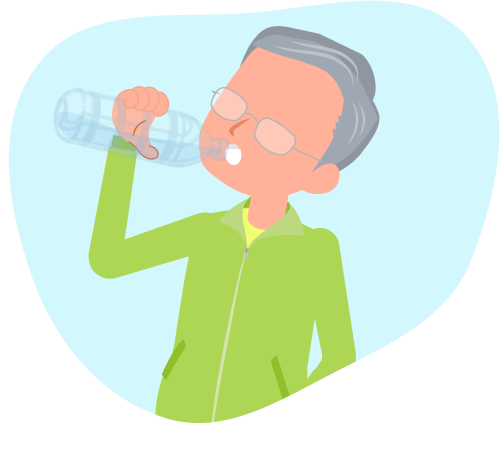Kegagalan Ginjal
- Ruang Utama
- >
- Kegagalan Ginjal
- >
- Panduan Pemakanan Secara Bijak Bagi Pesakit CKD
Ikuti kami di Facebook
Ikuti kami di Instagram
Ikuti kami di YouTube
Ikuti kami di TikTok
Panduan Pemakanan Secara Bijak Bagi Pesakit CKD
Mempelajari cara-cara pemakanan yang sesuai adalah penting
Apabila fungsi ginjal mulai menurun, pesakit yang menghidapi penyakit ginjal kronik (CKD) perlu menyesuaikan diet mereka untuk mencegah pengumpulan sisa dan cecair yang berlebihan. Matlamatnya ialah untuk mengekalkan fungsi ginjal yang sedia ada dan untuk melambatkan perkembangan Penyakit Ginjal Kronik, terutamanya tahap 5 yang memerlukan dialisis atau pemindahan ginjal. Keperluan diet pesakit mungkin berbeza-beza dengan perkembangan penyakit ginjal mereka.
Peringatan:
- Pengubahsuaian diet berbeza mengikut individu atas faktor usia, saiz badan, gejala, tahap CKD, tahap aktiviti dan keadaan kesihatan yang lain.
Protein
Pesakit pra-dialisis memerlukan kurang protein berbanding dengan pesakit dialisis.
Ginjal yang terjejas masih dapat berfungsi pada tahap awal CKD. Namun, agak sukar bagi ginjal untuk membuang segala produk sisa daripada badan.
Pengambilan protein yang terlalu banyak menyebabkan ginjal bekerja secara berlebihan. Ini akan menyebabkan lebih banyak kerosakan kepada ginjal.
- Pengambilan protein yang mencukupi dan tidak berlebihan dapat bantu memelihara fungsi ginjal serta mencegah tekanan tambahan pada ginjal. Pakar pemakanan atau doktor anda akan menasihati jumlah protein yang sesuai untuk diambil setiap hari.
Fosforus
Apabila keupayaan ginjal untuk menapis sisa-sisa produk semakin berkurang, paras fosfat dalam darah pula akan meningkat.
Paras fosfat yang berlebihan dalam darah boleh menyebabkan kegatalan pada kulit, sakit sendi, iritasi mata dan tulang yang lemah dan rapuh.
Pesakit pra-dialisis mungkin perlu mengehadkan pengambilan fosfat dalam makan mereka ketika Kadar Penapisan Glomerular (GFR) mereka menurun dan ujian darah menunjukkan paras fosfat yang lebih tinggi.
- Elakkan makanan yang berfosfat tinggi seperti:
- Sardin, ikan bilis dan belachan
- Makanan yang telah diproses dan makanan dalam tin (seperti daging atau ikan, sosej, patti daging)
- Produk tenusu (seperti susu, keju, yogurt).
- Produk kekacang (pelbagai –jenis kekacang, bijian, sup kacang)
- Minuman malt (seperti Milo, Horlicks, Ovaltine).
- Coklat dan produk berkaitan
- Daging organ (seperti hati, usus)
- Sup berasaskan tulang (seperti kaki ayam dan tulang rusuk)
- Minuman Cola
Kalium
- Kalium ialah sejenis bahan mineral yang penting untuk fungsi saraf dan otot.
- Paras kalium yang berlebihan dalam darah boleh menyebabkan kelemahan otot, kadar degupan jantung yang tidak normal dan dalam kes ekstrem, kegagalan jantung.
- Keperluan kalium boleh diubah bergantung pada tahap CKD yang berbeza. Pesakit pra-dialisis perlu menyekat pengambilan kalium sekiranya ujian darah menunjukkan paras kalium dalam darah yang tinggi.
- Elakkan makanan berkalium tinggi seperti:
- Buah-buahan dan sayur-sayuran daripada kumpulan kalium tinggi.
- Bijirin, roti dan biskut gandum.
- Kekacang, bijian dan produk berkaitan (seperti coklat, mentega kacang).
- Kelapa dan produk berkaitan (seperti santan, kaya).
- Semua jus buah-buahan dan sayur-sayuran segar/ditinkan, minuman ubat herba, teh/kopi pekat minuman koko dan malt, susu, wain.
- Gula perang, molase, sirap mapel, tofi, likuoris.
- Pengganti garam kalium tinggi, sos botol, ekstrak daging dan sayur-sayuran, pati ayam, kiub stok.
Tip! Anda boleh mengurangkan kandungan kalium dalam sayur-sayuran dengan merendam sayur-sayuran yang telah dipotong kecil di dalam air selama 1 hingga 2 jam.
Natrium
- Secara semula jadi, natrium terdapat dalam pelbagai jenis makanan dan selalu boleh didapati daripada makanan yang dibungkus dan diproses. Garam ialah salah satu sumber utama natrium.
- Natrium akan menyebabkan anda rasa dahaga lalu merangsang agar minum air berlebihan. Akibatnya, berat badan bertambah kerana cecair yang berlebihan dan meningkatkan tekanan darah disamping menambah beban pada jantung.
Sekatan pengambilan natrium dalam penyakit ginjal membantu untuk mengekalkan keseimbangan cecair normal.
Tip-tip untuk mengurangkan pengambilan natrium:
- Hadkan penggunaan garam/sos semasa memasak.
- Elakkan penggunaan kiub stok, ekstrak daging dan sayur-sayuran seperti Bovril dan Marmite.
- Elakkan pengambilan pati ayam yang berbotol.
- Baca label pada makanan diproses dan pilihlah produk-produk yang mengandungi kandungan garam yang kurang daripada 120mg natrium bagi setiap 100g produk makanan tersebut.
- Kurangkan pengambilan makanan dalam tin dan diproses. Jika anda masih ingin mengambilnya, buang air garamnya terlebih dahulu.
- Gunakan herba segar dan rempah ratus untuk menggantikan garam/sos semasa memasak.
- Gunakan limau segar, jus lemon atau cuka untuk menyedapkan lagi hidangan anda.
Penting! Pesakit ginjal hendaklah berhati-hati dengan pengganti garam kerana ia sering mengandungi kadar kalium yang tinggi. Sebaiknya, dapatkanlah nasihat daripada doktor anda atau pakar pemakanan sebelum menggunakannya.
Pengambilan Cecair
- Pengambilan cecair pada umumnya tidak dihadkan pada tahap awal bagi pesakit CKD kecuali jika dinasihatkan oleh doktor ginjal mereka.

* Maklumat dan rekomendasi di atas adalah garis panduan umum, dan tidak boleh dianggap sebagai nasihat khusus untuk mana-mana individu. Sila dapatkan nasihat doktor anda atau penasihat penjagaan kesihatan yang lain untuk membuat keputusan kesihatan peribadi.





